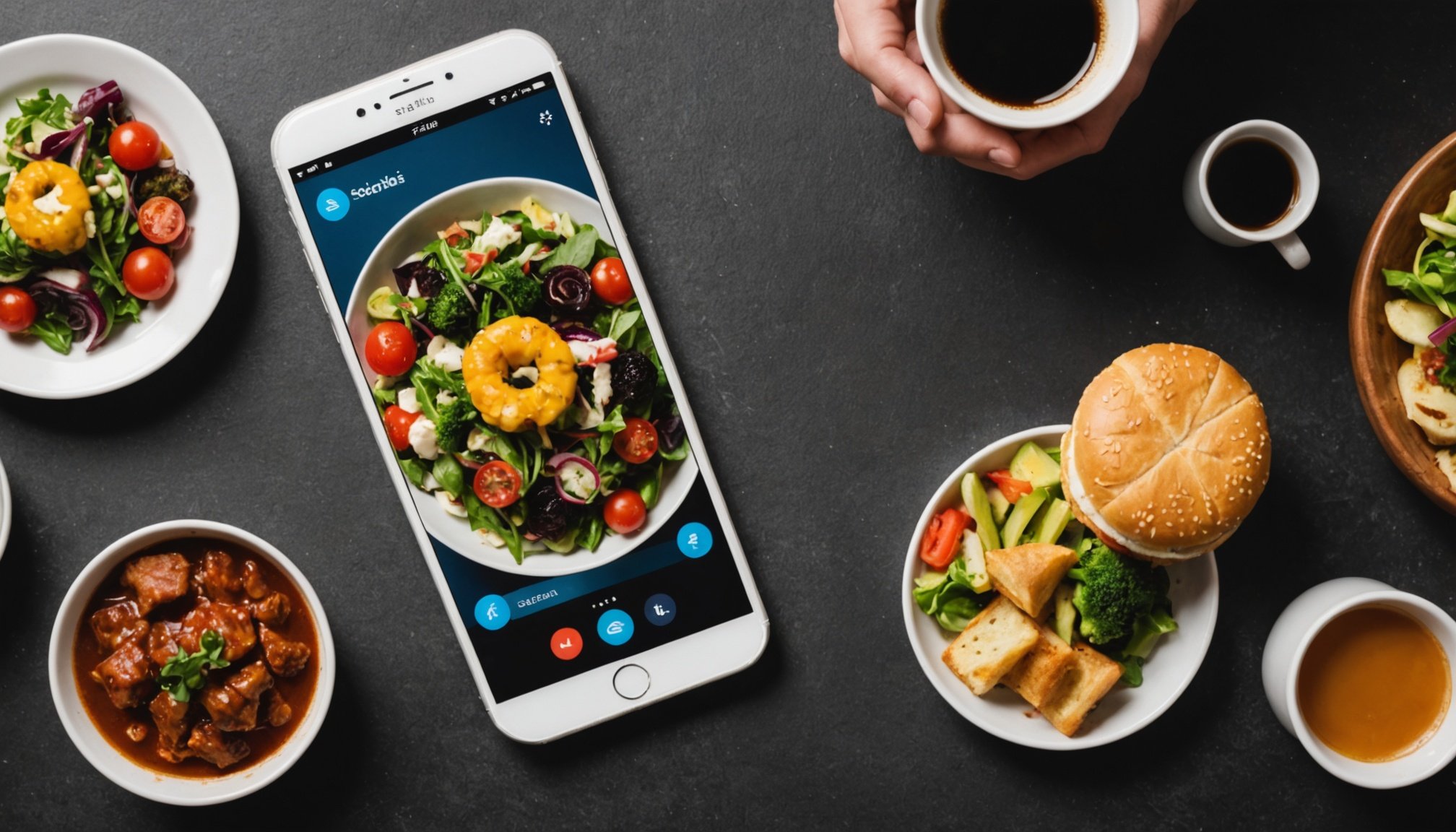Understanding Social Media Strategy in the Restaurant Industry
Crafting a social media strategy that’s unique to a restaurant’s brand is essential. This tailored approach not only helps in building an engaging online presence but also significantly boosts customer loyalty. Why is it crucial? A successful strategy connects with diners, encouraging them to share their experiences, which organically increases a restaurant’s visibility.
In today’s digital landscape, restaurant marketing on social media creates numerous touchpoints with potential customers. Platforms like Instagram and Facebook offer restaurants the opportunity to showcase their dishes, ambiance, and values visually, driving engagement and increasing reach. For example, posting enticing images of your signature dishes during peak hours can capture the attention of those contemplating their next meal.
Also to see : Boosting local business growth: harnessing geofencing for powerful marketing tactics in the uk
The UK restaurant industry faces unique challenges in digital marketing. With the Brexit-induced shifts in the economy and fluctuating consumer confidence, maintaining an adaptable social media strategy is more important than ever. Restaurants must navigate these hurdles by staying informed about digital trends and leveraging customer feedback for improvement.
In essence, a well-crafted online presence is not just a marketing necessity; it is an opportunity to tell your restaurant’s story and foster a deeper connection with your audience.
Topic to read : Transforming uk charities: harnessing ai to elevate donor connection and impact
Goal Setting for Social Media Success
Embarking on a social media journey requires defining clear, actionable goals tailored to your restaurant’s brand. These goals provide direction and ensure that every post and interaction contributes to the overarching strategy. Start by asking yourself: What do you want to achieve through social media? Whether it’s enhancing brand awareness, driving traffic, or boosting engagement, your goals should be precise and actionable.
Once you have defined your goals, it’s essential to identify key performance indicators (KPIs) that will help measure success. KPIs can include metrics like follower growth, engagement rate, and website clicks. These indicators offer tangible insights into how well your social media efforts meet your objectives.
Equally important is aligning your social media goals with your restaurant’s overall business objectives. This alignment ensures that your digital presence supports broader ambitions, such as increasing table reservations or promoting new menu items. By maintaining consistency between social media goals and business aims, you create a cohesive strategy that enhances your restaurant’s success in the digital realm.
In summary, goal setting is crucial for social media success, emphasizing the need for KPIs and alignment with business objectives.
Selecting the Right Social Media Platforms
Choosing the ideal social media channels for your restaurant can significantly impact your success. In the UK, popular platforms include Instagram, Facebook, and Twitter. Each offers unique opportunities for audience engagement. But how do you decide which to prioritise? Analyse where your target audience spends their time and how they interact with content. For instance, Instagram is visually driven, appealing to a younger demographic with an appetite for vibrant, shareable images. Meanwhile, Facebook might attract an older audience who prefer detailed updates and community interaction.
When considering platform selection, think about your restaurant type. A trendy café might thrive on a dynamic platform like Instagram, whereas a family-friendly diner might do better on Facebook due to its diverse user base. Additionally, understanding market demands is crucial. If your competitors are successful on particular platforms, it may indicate where your potential customers congregate.
Evaluating these behaviours can guide strategic platform selection that aligns with your restaurant’s style. This ensures you’re not just present online but actively engaging with the right audience. Ultimately, this will enhance your restaurant’s digital footprint and attract more patrons.
Crafting Engaging Content for Your Audience
Creating engaging content is pivotal for capturing your audience’s interest, particularly in the vibrant UK restaurant scene. Diverse content types, such as mouth-watering recipes, chef interviews, and dining experiences, resonate with local audiences. These formats highlight unique restaurant offerings while fostering a sense of connection with customers.
A visual storytelling approach is indispensable in food marketing. High-quality images and videos capture more than just the meal; they convey the restaurant’s ambiance and the sensory delight of dining. This method nurtures audience engagement by immersing potential diners in the experience before they even step foot inside.
To craft shareable and engaging posts, consider these tips:
- Use captivating images that tell a story.
- Craft concise yet enticing descriptions that lure audiences in.
- Encourage interaction through prompts or questions related to your content.
Harnessing these strategies not only attracts new customers but also compels existing ones to return, engage, and share their own experiences. The key is to amalgamate these elements into a cohesive plan that speaks directly to your audience’s preferences and passions, ensuring every piece of content resonates and captivates.
Developing a Content Calendar
Creating a structured content calendar is essential for ensuring consistency and engagement. By engaging in thorough content scheduling, restaurants can guarantee that their social media presence is steady and aligned with their brand goals. It helps in effectively managing posting times and capturing the audience’s interest.
Tools and Templates for Organization
Utilizing various tools and templates can simplify calendar management. Platforms like Google Calendar or Trello offer user-friendly interfaces for setting up a content schedule. They allow for easy tracking and modifications, facilitating seamless planning. Templates also come in handy for organizing social media posts effectively, helping restaurants keep track of upcoming promotions or events.
Best Practices for Scheduling Content
To maximise the effectiveness of social media content, it is important to align posts with restaurant promotions and events. Planning content in advance around events ensures a cohesive and targeted approach. Consider scheduling posts during peak hours when the audience is most active to boost engagement. Crafting a detailed content calendar promotes strategic thinking and allows for better monitoring of campaign outcomes.
By mastering these scheduling tactics, restaurants can ensure that their social media efforts resonate with their audience.
Analyzing and Measuring Success
In the world of social media analytics, understanding how to effectively measure and interpret the success of your campaigns is crucial. Utilizing specific techniques for tracking metrics such as engagement rates, reach, and conversions helps in evaluating the impact of your social media efforts. Metrics like these serve as a barometer for performance.
Interpreting this data enables you to refine and improve social media strategies. By identifying which types of content resonate most with your audience, you can adjust future posts to increase effectiveness and engagement. For instance, if video content is generating higher engagement, focusing on more video posts can optimize your strategy.
Choosing the right tools for social media reporting is equally important. Tools such as Google Analytics, Hootsuite, and Sprout Social offer comprehensive analysis options, allowing you to dive deeper into your campaign performance. They help in creating detailed reports that highlight what’s working and what isn’t, ultimately guiding your decision-making process.
With robust data interpretation and performance measurement, you’ll be equipped not only to track but also to analyze outcomes more effectively. This comprehensive approach allows you to make informed decisions and drive towards success in your social media endeavors.
Advertising on Social Media for Restaurants
Social media advertising offers unique opportunities for restaurants to connect with potential customers in the UK. By implementing strategic promotional strategies, restaurants can effectively reach their target audience. Platforms like Facebook and Instagram provide robust tools for creating and managing targeted ads. These tools offer detailed options to define demographics, interests, and behaviors to align with the restaurant’s ideal customer profile.
Crafting ads that convert involves understanding these preferences and delivering engaging content. This could mean highlighting menu specials, sharing customer reviews, or even promoting events. The aim is to create an emotional connection that drives potential customers to make a reservation or visit the restaurant.
Effective budgeting and measuring return on investment (ROI) in social media advertising ensures continued success. Start by setting a clear budget tailored to your restaurant’s size and market. Tools like Facebook Ads Manager provide insights into ad performance by tracking metrics like engagement, click-through rates, and conversions. Monitoring these metrics allows for adjustments in strategy to improve outcomes over time.
Implementing these social media advertising strategies not only increases visibility but also enhances the overall customer experience. The result is a stronger online presence and potentially increased foot traffic.
Case Studies: Successful UK Restaurant Strategies
Exploring case studies of UK restaurants’ successful campaigns reveals the potential of creative social media strategies. A standout example is a small London bistro that leveraged Instagram Stories to engage its audience, amplifying customer interaction through behind-the-scenes content. The restaurant’s success hinged on understanding customer behaviour by creating visually appealing stories during peak dining hours, resulting in increased foot traffic.
Success stories across the UK reflect adaptations to evolving consumer preferences. A notable trend is the focus on sustainability, with establishments highlighting eco-friendly practices. For instance, one diner’s plastic-free campaign went viral, bolstering its profile by tapping into the burgeoning environmental consciousness of the clientele.
From these best practices, valuable lessons emerge. Key is the power of storytelling and authentic customer engagement. Restaurants organising interactive polls or Q&A sessions on platforms such as Twitter gain insights while fostering a two-way dialogue, enhancing customer loyalty.
Adapting innovative strategies is vital for future social media campaigns. As case studies suggest, a strong emphasis on personalisation and locally relevant content can significantly differentiate a restaurant in a crowded market. Embracing these tactics not only improves brand visibility but also drives sustainable growth.
Overcoming Challenges in Social Media Marketing
Social media marketing presents unique challenges for restaurants, particularly with evolving digital landscapes and changing consumer expectations. A key hurdle is maintaining customer engagement across multiple platforms while ensuring consistent branding. Restaurants must also navigate the rapidly changing algorithms of social media networks, which can limit organic reach and necessitate strategic paid promotions.
To address these challenges, solutions such as crafting a strong, authentic brand voice are essential. Developing a content calendar aids in maintaining consistent posting schedules and aligning content with promotions and events. Additionally, utilising platform-specific strategies can enhance reach and engagement. For example, Instagram may require visual storytelling through high-quality images, while Twitter benefits from quick, engaging updates.
The UK restaurant market showcases adaptability by embracing these strategies, with many establishments leveraging user-generated content and collaborations with influencers to boost visibility. Successful restaurant marketing often involves creating engaging campaigns that resonate with local cultures and dining trends.
Through adaptability and strategic planning, restaurants can not only overcome these challenges but also enhance their brand presence and customer loyalty in the ever-evolving social media landscape.











